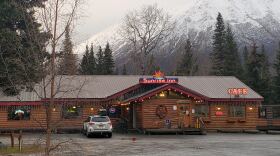You could have waved a vial of peppermint oil under Reilly Selmser’s nose last week and she wouldn’t have noticed.
“And then on Sunday last weekend, I completely lost all sense of taste and smell," she said. "And it was not just diminished, it was gone.”
Selmser, who lives in Kenai, tested positive for the coronavirus earlier this month. Her mandated quarantine officially ended yesterday.
Still, she’s only feeling about 70 percent normal. The loss of taste and smell has been the most disconcerting symptom, Selmser said, but is only one of many she’s experienced since contracting the virus less than two weeks ago.
She thinks she got sick from her daughter, who likely picked it up from a family member. Her daughter was attending in-person classes at the time, as a special education student. When Selmser got word of the exposure, she pulled her daughter out of school and notified both the school and her employer.
Then, they both got rapid tests. Selmser’s rapid test came back negative, but four days later she got a positive result.
Her daughter had symptoms for just a few days. Selmser’s lasted longer. She said it began with a sore throat and general feelings of weakness that got progressively worse.
“By Wednesday that week, I had really extreme fatigue, the worst headache I’ve ever had in my entire life. Nothing would help," she said. "And then I developed a fever and really severe dizziness to the point where I actually fainted a couple times, just walking across my apartment. I think it was Thursday night, I just got up in the middle of the night to go to the bathroom and twice passed out. I wound up crawling on my hands and my knees to my living room and grabbing a chair and basically using a chair like a makeshift walker because I was just so dizzy and weak.”
And then there was the loss of smell and taste.
“That’s been the strangest system, because of course I had heard that that happened to people, but it’s a totally different thing to experience it yourself," she said.
Selmser’s mom is a nurse and encouraged her to get a pulse oximeter, which is used to measure oxygen saturation levels in blood. Luckily, those levels remained steady.
“I did not expect to get so sick, personally. I believe that COVID is a very dangerous virus, and obviously 240,000 Americans have died so far. But I just didn’t think, me being otherwise healthy, that I was going to get so sick," she said. "And the other really frustrating thing is that we had both been so careful. I mean, we had been wearing masks in public since last February, constantly washing our hands, using hand sanitizer. We had very limited social exposure. So I did not expect to get this at all. I was very surprised.”
Selmser and her daughter stayed home for 10 days while friends brought them food and things to do.
“Honestly, the hardest part was explaining the whole thing to my 10-year-old," she said. "And keeping her entertained while she felt fine and I was really sick.”
Cases were rising on the peninsula as Selmser waited out her quarantine. There are now 438 active cases of coronavirus in the Kenai Peninsula Borough, though that number is likely higher, due to delays in testing and contact tracing. At the beginning of the month, the active case number was still in the double digits.
These numbers are emblematic of statewide trends. Many communities in rural Alaska that were once insulated from the virus are now getting pummeled, too.
High case rates have closed in-person classrooms on the peninsula. Most establishments remain open and mask-optional. Despite advice from state health officials about avoiding large gatherings, several in-person Halloween parties are slated to continue at peninsula bars and restaurants this weekend.
Selmser said the family member who she thinks spread the virus to her daughter most likely picked up their case at a bar.
When she tested positive, her daughter’s entire class at Mountain View Elementary was told to quarantine. When asked if other cases came out of that classroom, Pegge Erkeneff of the Kenai Peninsula Borough School District said that the school district has only had one instance where transmission at a school might have occurred, and that this was not that instance.
The nature of Selmser’s job makes it impossible for her to work from home. She will return to her office when she’s cleared two negative test results.
She said she worries about misinformation making it easier for the virus to spread.
“My biggest concern that came to my attention from this whole experience is that people don’t understand that you can not test out of quarantine. I know quite a few people who recently had exposure to a known positive case, so they said that they were going into quarantine, and then after, say, three days, they got a negative test and just went back to business as usual," Selmser said. "The way that public health explained it to me, per CDC guidelines, is that you have exposure to a known positive case and that includes 15 minutes or more within a 24-hour period, that you have to quarantine for a full 14 days. ... And I really think that that’s a big factor in why it’s spreading so badly right now.”
When she eventually does venture out of the house, Selmser said she’ll continue to wear a mask and avoid large groups.




